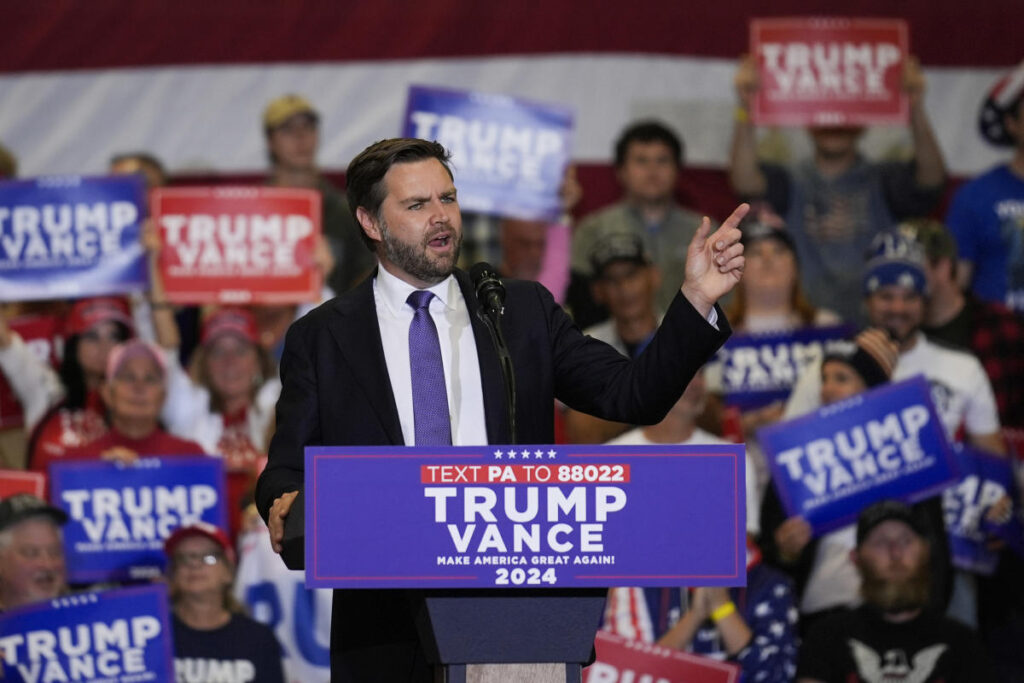Since joining Donald Trump’s presidential campaign as his running mate, Ohio Senator JD Vance has been notably reticent about directly addressing questions related to the controversial 2020 election. Instead of providing a clear stance, Vance often deflects the issue, claiming a focus on future priorities rather than past events. This approach was highlighted during a recent rally in Pennsylvania when a reporter pressed him on why he has not given a straightforward answer on whether Trump lost the election to Joe Biden. The crowd reacted with boos, but Vance firmly stated he had addressed the question numerous times, asserting, “I think there were serious problems in 2020.” His response was notably vague, neither confirming nor denying the election outcome in conventional terms.
Vance’s dialogue around this contentious issue marks a significant moment in his political strategy. In the past, his responses have leaned towards evasion, particularly during a debate with Democratic vice-presidential nominee Tim Walz. When questioned about the 2020 election, Vance opted for the catchphrase of focusing on the future, a move criticized as inadequate by pundits and opponents alike. Walz characterized Vance’s response as a “damning non-answer,” embellishing the argument that Vance may be reluctant to alienate Trump’s robust base support while simultaneously reaching out to independent voters who may be hesitant about Trump’s continuous claims of election fraud.
This reluctance is indicative of a broader trend within the Republican Party. Many GOP politicians share Trump’s perspective regarding the potential for electoral malfeasance, a sentiment echoed during Trump’s appearances. For instance, in a recent event in Nevada, Trump warned attendees against a repeat of “what happened in 2020,” signaling his ongoing belief that the election was tainted by some form of fraud—albeit without substantiated proof. This conjecture resonates deeply with a significant segment of Republican supporters, many of whom remain convinced that the election was stolen.
Vance’s challenge lies in managing this tightrope walk: on one side, he faces the risk of alienating Trump’s die-hard supporters; on the other, he must appeal to a broader spectrum of voters who may be disillusioned with unfounded accusations of election fraud. His repeated refusal to explicitly state that Biden won the 2020 election—an assertion he notably sidestepped in a New York Times interview—illustrates this delicate balancing act. Vance’s ability to navigate these waters will be crucial as he continues his campaign leading up to the 2024 election.
The implications of Vance’s and Trump’s narratives are significant. They highlight a persistent division in American political discourse, particularly around notions of election integrity and democratic legitimacy. The former President’s declarations, which primarily lack substantiated evidence, reinforce a culture of skepticism regarding electoral processes among his followers. These beliefs are further cemented when influential figures like Vance align themselves with his perspectives while avoiding clear acknowledgments of the opposing viewpoint, effectively perpetuating a cycle of misinformation.
As the electoral cycle heats up, how Vance addresses these issues could shape not only his political future but also the broader landscape of the Republican Party. With critical elections on the horizon, the struggle to articulate a coherent stance on the validity of past elections could play a pivotal role in determining voter dynamics. The pathway Vance chooses—whether to risk alienation of moderates or maintain steadfast loyalty to Trump’s narratives—may have lasting consequences that extend well beyond the 2024 election cycle itself. His evolving narrative reflects the greater complexities of partisan politics, where silence can speak volumes in an arena charged with divisive sentiments and entrenched ideological beliefs.

